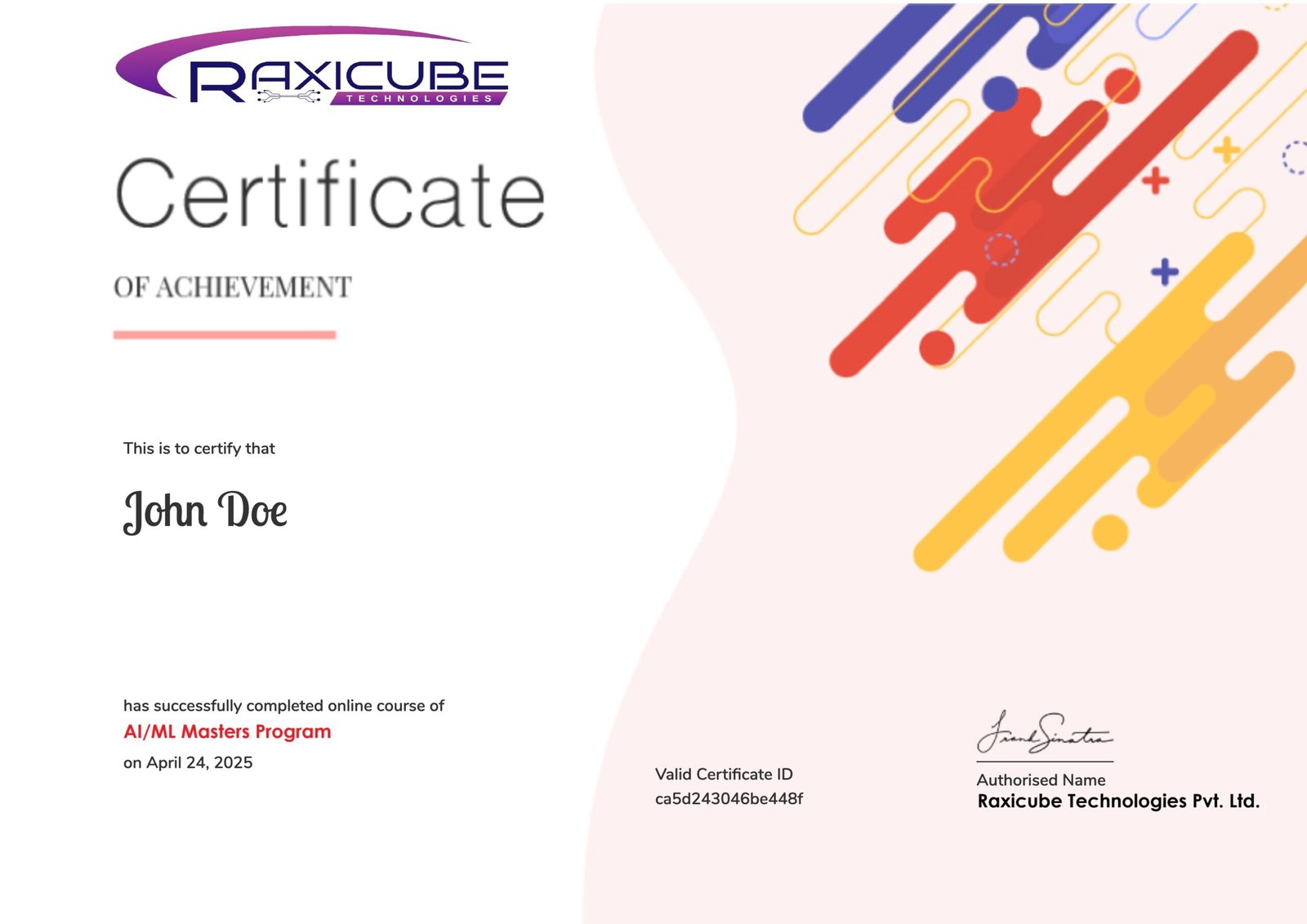Our Full-Stack Generative & Agentic AI Engineering Bootcamp is designed to make you a skilled AI engineering professional by mastering the most in-demand frameworks and tools used in modern LLM and agentic system development. This comprehensive training covers LangChain, LangGraph, RAG Pipelines, Vector Databases, CrewAI, AutoGen, Agno, HuggingFace, and n8n, MCP, enabling you to build intelligent, scalable, and automation-driven AI applications. You will gain hands-on experience with AI agents, multi-agent workflows, retrieval systems, document processing, and LLM orchestration using real-world datasets and industry projects. The course is aligned with today’s rapidly growing demand for Agentic AI Engineering, ensuring that you not only learn the tools but also build expertise required to design autonomous, context-aware, and production-ready systems. By working on real-time and workflow-based AI projects, you will develop the skills to integrate diverse data sources, optimize RAG pipelines, orchestrate agents, and deliver business-ready AI solutions. Whether you are starting your AI journey or upskilling for the future, this program prepares you for high-demand roles such as AI Engineer, RAG Specialist, LLM Developer, and Agentic AI Developer across industries.
If you have three or more people in your training we will be delighted to offer you a group discount
If you want to give the Trending technology experience to your esteemed employees, we are here to help you.
2. CrewAI Framework
3. AutoGen Framework
Raxicube Technologies Certification is accredited by all major Global Companies around the world. We provide certification after completion of the theoretical and practical sessions to freshers as well as corporate trainees. Our certification at Raxicube Technologies is accredited worldwide, increasing the value of your resume. This allows you to attain leading job posts with the help of this certification in leading MNC’s of the world. The certification is only provided after successful completion of our training and practical based projects.








Artificial Intelligence refers to the capability of machines to imitate human intelligence processes. These systems perform tasks like learning, problem-solving, and decision-making by analyzing data, identifying patterns, and making predictions. Core AI subfields include machine learning, natural language processing, robotics, and computer vision.
Agentic AI enables autonomous agents that can plan, reason, and act independently. It is the next evolution in AI development and a highly in-demand skill.
Agentic AI refers to AI systems that can plan, reason, and take autonomous actions using tools, memory, and multi-step thinking. Unlike chatbots, they can execute workflows, retrieve information, perform tasks, and collaborate with other agents.
Artificial intelligence (AI) and AI engineering have been witnessing significant growth, and numerous statistical indicators support the attractiveness of becoming an AI engineer.
Raxicube’s Generative & Agentic AI course offers a comprehensive learning path designed to make you a proficient Agentic AI Engineer. It covers core concepts and advanced topics, providing practical knowledge through instructor-led and self-paced modules.
This course is ideal for:
Beginners exploring AI/ML
Data science professionals
Software engineers integrating ML into applications
Business analysts and tech enthusiasts
Yes. It starts with fundamentals, then gradually moves to advanced LLM and agentic workflows.
Basic Python knowledge is helpful but not mandatory. The course starts from fundamentals and gradually moves into advanced concepts. Even non-IT learners can follow.
Yes. Many freshers and career-switchers successfully learn these skills. The course is designed with hands-on walkthroughs, exercises, and guided projects that help beginners catch up quickly.
Yes. Many non-IT students succeed because the course starts from basics and moves step-by-step into advanced engineering. The hands-on approach makes it easy to follow.
No. This course focuses on AI engineering, not ML model training. You do not need deep math skills to work with Generative AI, RAG systems, or agentic frameworks. Basic logical thinking is enough.
No problem! This course focuses on engineering and implementation, not academic math.
Not at all. Agentic AI and RAG engineering rely on LLM orchestration, retrieval workflows, tools, memory, and pipelines — not ML algorithms. Even someone with no ML background can learn this comfortably.
No. LangChain, LangGraph, CrewAI, and AutoGen are frameworks that sit on top of LLM APIs, so you only need Python fundamentals. You are not training models — you are orchestrating them.
No. You don’t need to know training internals. You only need to know how to use LLMs effectively — prompts, retrieval, memory, agents, workflows, and deployment.
Yes — chains, memory, tools, agents, LLM workflows, RAG, LCEL, and LangChain tool integrations.
Raxicube’s Generative & Agentic AI Course is a thoughtful compilation of Instructor-led Program. After each session Student can watch session recording in self-paced manner. This blended approach allows learners to be guided by industry experts during live sessions while also providing the flexibility to learn at their own pace through comprehensive self-study materials.
LangGraph is the newest and most powerful framework for agentic systems. We teach it from scratch, including state management, nodes, workflows, memory, and deployment.
Yes, the course includes hands-on labs on all major vector stores.
Yes. You will build RAG pipelines end-to-end using LangChain, LangGraph, vector databases, embeddings, retrievers, and deploy them using Docker/AWS.
Yes. The course includes complete hands-on projects that teach you how to create collaborative agents, role-based agents, and task-driven multi-agent systems.
Absolutely. You’ll learn MCP architecture, tools, server setup, and Anthropic integration.
Yes — Neo4j + LangChain + Cypher for semantic search and reasoning.
Yes — you will build multiple end-to-end projects including RAG pipelines, multi-agent systems, autonomous agents, and LangGraph-powered apps.
You will build 5 to 7 complete AI systems, covering:
RAG apps
Multi-agent orchestration
Automation pipelines
Knowledge Graph-based search
Streamlit web apps
No GPU required. Cloud tools and efficient local models allow you to run everything on a normal laptop.
Yes, upon successful submission and verification of the final assessment for each individual course within the learning pathway, you will receive a certificate of completion for that specific course.
Yes — the schedule (2 days a week × 3 hours) is designed for working professionals.
You will get 1.5 years of access to the study materials for this AI and Machine Learning Course. You can access it anytime from anywhere.
Definitely, yes. We help students in their job search endeavors, providing guidance and support to secure relevant opportunities.
You will never miss a lecture at Raxicube Technologies. You can view the recorded session of any missed live class at your convenience.
After completing the Full-Stack Generative & Agentic AI Engineering Bootcamp, you become eligible for a wide range of high-demand AI engineering roles across industries. Because this course covers LangChain, LangGraph, RAG pipelines, vector databases, multi-agent systems, and deployment skills, you will be equipped for both development and architecture-level positions.
• Agentic AI Engineer / Multi-Agent Developer
Build autonomous agents and multi-agent systems using CrewAI, AutoGen, Agno, and LangGraph.
• Generative AI Engineer
Develop LLM-powered solutions, chatbots, assistants, automations, and reasoning systems.
• RAG Engineer (Retrieval-Augmented Generation Engineer)
Create and optimize RAG pipelines, retrieval systems, document search apps, and semantic search solutions.
• LLM Engineer / AI Engineer
Work with modern LLM APIs (OpenAI, Groq, Gemini, Anthropic), model integration, evaluation, and workflow design.
• AI Automation Engineer
Automate workflows using n8n, LangFlow, and agent-based task orchestration.
• Full-Stack AI Application Developer
Build complete AI apps using Streamlit and backend RAG/agent pipelines.
• Conversational AI Developer / Chatbot Engineer
Create intelligent support systems, assistants, and multi-step conversation agents.
• Vector Database Engineer / Semantic Search Developer
Implement Pinecone, FAISS, ChromaDB for embeddings, indexing, and scalable retrieval.
• AI Solutions Architect (with experience)
Design enterprise-grade RAG + Agent systems and deploy them with Docker & AWS.
IT Services, SaaS, Finance, Healthcare, Startups, E-commerce, Telecom, Ed-Tech, Consulting.
Companies now rely on RAG pipelines, AI agents, and autonomous workflows to automate processes, reduce costs, and build intelligent copilots. Skilled engineers who can implement these systems are in short supply, making this one of the highest-growth career paths in 2025 onwards.
Basic Python knowledge is enough. We teach everything needed to build advanced AI systems. We Teach Basic Python too in this Course.
Yes — Docker, AWS (S3, ECR, EC2, Bedrock), GitHub Actions, and production model serving with BentoML are covered.
Absolutely. The curriculum is built for developers, data engineers, ML engineers, analysts, QA engineers, DevOps, and anyone transitioning into AI engineering.
Yes. The bootcamp is 100% practical, with real-world code labs, downloadable notebooks, templates, and full end-to-end AI projects.
Yes. Deployment is covered using:
Docker
AWS EC2/S3/ECR
Serverless workflows
BentoML for model serving
You will work with LangChain, LangGraph, CrewAI, AutoGen, Agno, n8n, LangFlow, HuggingFace, FAISS, ChromaDB, Pinecone, OpenAI, Gemini, Groq, Anthropic, Neo4j, MCP, Docker, AWS, and BentoML — everything required for modern AI engineering.
You will build 5+ real AI projects, including:
Multi-Agent RAG system
Document search RAG app
LangFlow automation
n8n AI workflow
Knowledge Graph + RAG
Autonomous reasoning agents
Streamlit AI apps
You can apply for roles like:
AI Engineer
Agentic AI Developer
Generative AI Engineer
RAG Engineer
LLM Engineer
Multi-Agent Workflow Developer
Automation Engineer
Chatbot Developer
Full-Stack AI Engineer
Almost every industry now hires AI engineers:
Finance, Healthcare, E-commerce, SaaS, Telecom, Manufacturing, Insurance, Ed-Tech, and Startups.
Yes — Agentic AI is the fastest-growing AI skill worldwide, with explosive demand due to autonomous decision-making systems and AI workflow automation.
Yes, all project files, code templates, slides, and practice exercises are provided.
Yes. You will build Streamlit frontends or use simple UI frameworks along with complete backend pipelines.
Only basic Python and a willingness to learn. No prior AI background required. We cover basic Python too in this Course.
Yes — a professional Full-Stack Generative & Agentic AI Engineer Certificate will be issued.
Yes — the course includes LangGraph, CrewAI, AutoGen, Agno, MCP, Groq, Gemini, and modern RAG engineering, which are the newest technologies in the industry.
It is 70% hands-on coding and 30% conceptual understanding. You’ll build practical AI systems rather than learning ML math or algorithms.
No traditional ML topics like regression, classification, feature engineering, etc.
Instead, you’ll learn:
RAG
Multi-agent systems
Orchestration frameworks
Vector search
Automation workflows
LLM-based pipelines
Yes. Many ML engineers transition into LLM engineering. This course builds your foundation in AI workflows, data handling, APIs, and reasoning systems, making ML easier later.
Not required. But if you have DE experience, you’ll learn RAG, retrieval, embeddings, and agents much faster because of your familiarity with pipelines and data systems.
Absolutely. ML engineers are the fastest to adopt agentic AI skills. This course gives you the new engineering stack required for 2025 AI jobs.
In India, professionals with about 2–5 years of experience in agentic AI roles command average salaries of around ₹25 lakh per annum. The Economic Times
At the senior level, salaries can range from ₹80 lakh to ₹2 crore plus, especially in roles focused on multi-agent systems and enterprise deployments. The Economic Times
Globally (e.g., remote or US-based roles), mid to senior AI engineer salaries average around US $97,500 per year (~₹80+ lakh) with top roles going significantly higher. Glassdoor+1
Key factors that influence salary
Company type (start-up vs product vs service vs consulting)
Technologies you master (e.g., multi-agent systems, RAG, LangChain, agent frameworks)
Your experience and role responsibility (developer → architect → lead)
Location (India vs remote vs US/Europe)
Project portfolio and demonstrable results